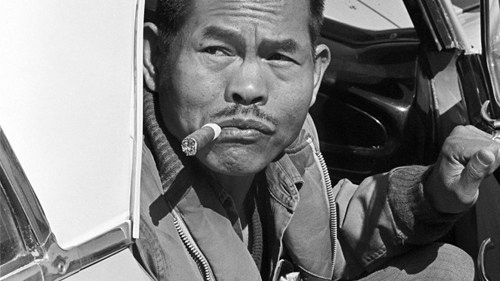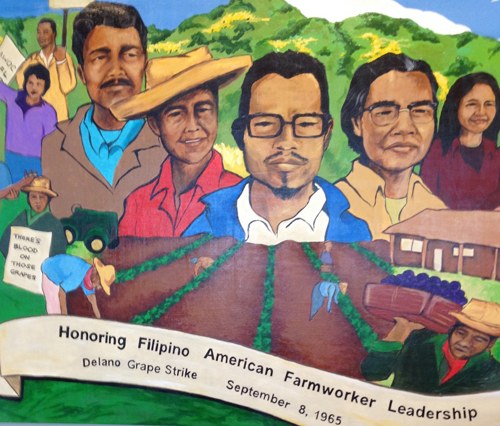By James Tabafunda
Northwest Asian Weekly

Larry Itliong, Filipino labor leader
Filipino American producer and director Marissa Aroy has a timely message.<!–more–>
Her documentary, “The Delano Manongs: Forgotten Heroes of the United Farm Workers,” adds an important, but missing, story about Filipino Americans who stood with Mexican American civil rights icon Cesar Chavez as dedicated members of the United Farm Workers Organizing Committee. It features “manongs,” the Filipino word for “older brothers” or “older Filipino gentlemen,” who traveled to the United States in the 1920s and 1930s with the shared vision of earning money in white-collar as well as blue-collar jobs.

Mural commemorating the Delano Malongs by Eliseo Art Silva
Once they arrived, most of them realized that they could only find menial jobs, migrating from one labor camp to another. And since most of them were bachelors, they were subject to California’s anti-miscegenation law (1850 to 1948), which banned interracial marriage.
“The Delano Manongs” tells the story of Larry Itliong and about 1,500 Filipino American farm workers in California who walked off their jobs in order to demand fair wages and better working conditions during the Delano Grape Strike of 1965. Other “manongs” include Philip Vera Cruz and Peter Velasco.
Itliong’s Agricultural Workers Organizing Committee merged with Chavez and the National Farm Workers Association (NFWA), which later became the United Farm Workers. The Filipino American and Mexican American solidarity changed the strike in rural Delano, Calif. into a national movement. Itliong became second-in-command under Chavez.

Mural commemorating the Delano Malongs by Eliseo Art Silva
His son, Johnny Itliong, provides such insights as, “He would stand up to anybody.” In addition to being a cigar-smoking, articulate, union veteran, Larry Itliong raised seven children and spoke seven languages. In the documentary, he said, “I’m not scared of nobody. And I’m a son of a (expletive) in terms of fighting for the rights of Filipinos in this country.”
Itliong’s philosophy (“If you’re going to punch me, I’m going to punch you back”) was not the same as Chavez’s. Aroy also said about Itliong, “And so, that’s not really good PR for the union, and it’s very opposite of what Cesar Chavez was after, which was non-violence.”
“A lot of the Filipinos, because that’s how they had grown up, under these really tough union and striking practices, they had to learn what this anti-violence movement, this peaceful movement was about. So that would be another reason why Larry Itliong didn’t become the leader.”
“The Delano Manongs” is a 30-minute documentary. It enlightens all of us that historical accounts of the civil rights movement in the 1960s need to be more inclusive. Filipino American activists deserve the same recognition given to Mexican American activists for organizing farm workers in California.

Mural commemorating the Delano Malongs by Eliseo Art Silva
Aroy has said her main goal is to get the story of these Filipino American farm workers taught in universities and high schools. Some educators and community leaders have agreed with her and have organized community screenings of the film. She pointed out, “The post-1965 generation, they don’t know this history at all.”
Recent interviews with Dolores Huertas, NFWA co-founder with Chavez, and interviews with grape growers provide the documentary with fairness and balance.
Sound recordings of Larry Itliong’s voice used in the film are supplemented with English subtitles to ensure his words (spoken with a slight Filipino accent) are easily understandable.
Most of the original Filipino American farm workers have died. The few survivors left are shown living in Delano’s Paulo Agbayani Retirement Village, a facility created specifically to honor these elderly and displaced Filipino Americans.
“The Delano Manongs” will be broadcast on PBS stations in 2015. (end)
For more information about “The Delano Manongs: Forgotten Heroes of the United Farm Workers,” go to www.delanomanongs.com.
James Tabafunda can be reached at info@nwasianweekly.com.




FYI
Just want to let you know. I was in a group of Filipino teenagers, who worked in a farm picking grapes in Delano in the summer of 1965–and, the strike came about late in the summer, got kicked out of the farm housing and slept in our cars parked around the Filipino Community Center.
We finally went back home to Mar Vista in Los Angeles (Zone 90066). We were fresh out of high school and attended Santa Monica City College. There were six of us boys–and, we all ended up joining the service in the following spring of 1966.
Tony Alagao, Jr. had relations in Delano who got us work then in the farm. Tony joined in the Army, as well as Mariano Tolentino–and, they both served in Germany. Leoncio Agustin and I joined in the Army too and we both served in Germany and Vietnam–although, Leoncio got sick afterward and passed. Rene Soriano joined in the Air Force and served in Japan. Abraham Pagtama joined in the Navy and also in the Army.
The Delano Manongs led these six young Filipino boys from L.A. through an unforgettable Summer of ’65, although unknowingly. We served that purpose then for the Filipino Community–and, we went on…
Thought I’d write to get on the roll call.